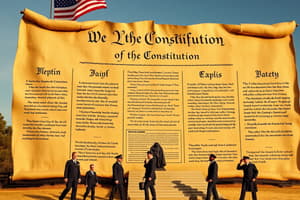Podcast
Questions and Answers
Which of the following are Seven Principles of the Constitution? (Select all that apply)
Which of the following are Seven Principles of the Constitution? (Select all that apply)
- Federalism (correct)
- Checks and Balances (correct)
- Popular Sovereignty (correct)
- Monarchy
What is Popular Sovereignty?
What is Popular Sovereignty?
The right of people to make political decisions for themselves.
What does Republicanism entail?
What does Republicanism entail?
People can exercise their power by voting for their political representatives.
Define Federalism.
Define Federalism.
What is meant by Separation of Powers?
What is meant by Separation of Powers?
What is the principle of Limited Government?
What is the principle of Limited Government?
What are Individual Rights?
What are Individual Rights?
Explain Checks and Balances.
Explain Checks and Balances.
Give an example of Popular Sovereignty.
Give an example of Popular Sovereignty.
Give an example of Republicanism.
Give an example of Republicanism.
Provide an example of Federalism.
Provide an example of Federalism.
Give an example of Separation of Powers.
Give an example of Separation of Powers.
Give an example of Checks and Balances.
Give an example of Checks and Balances.
Give an example of Limited Government.
Give an example of Limited Government.
Give an example of Individual Rights.
Give an example of Individual Rights.
Flashcards are hidden until you start studying
Study Notes
Seven Principles of the Constitution
- Core principles include Popular Sovereignty, Republicanism, Federalism, Separation of Powers, Checks and Balances, Limited Government, and Individual Rights.
Popular Sovereignty
- People possess the authority to make their own political decisions.
Republicanism
- Citizens exercise political power by voting for representatives who act on their behalf.
Federalism
- Power is shared and divided between national and state governments, allowing for local governance.
Separation of Powers
- Governmental powers are distributed among three branches: executive, legislative, and judicial, to prevent concentration of authority.
Limited Government
- All individuals, including government leaders, are subject to the law, ensuring accountability.
Individual Rights
- Fundamental liberties and rights are protected under the Bill of Rights, safeguarding personal freedoms.
Checks and Balances
- Each government branch has the authority to monitor and limit the powers of the other branches, preventing abuse of power.
Examples of Popular Sovereignty
- Local citizens can run for town mayor, influencing decisions that affect their community.
Examples of Republicanism
- Citizens participate in national elections, such as voting for the president every four years to select a representative.
Examples of Federalism
- States can enact laws independently as long as they do not contradict national legislation.
Examples of Separation of Powers
- The Executive branch is restricted from becoming a monarchy by ensuring power is not concentrated solely within it.
Examples of Checks and Balances
- The Judicial branch's decisions are subject to limits imposed by the combined powers of the Executive and Legislative branches.
Examples of Limited Government
- No individual, including the president, is above the law; illegal actions result in consequences regardless of status.
Examples of Individual Rights
- All individuals retain freedoms, such as the right to free speech, even if they have committed a crime.
Studying That Suits You
Use AI to generate personalized quizzes and flashcards to suit your learning preferences.




